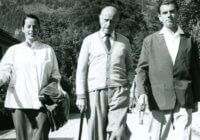New scientific publication documents the diverse health-promoting effects of fasting
Überlingen, June 15, 2020 – Fasting, especially intermittent fasting, is currently the subject of numerous scientific publications. The review “Unravelling the health effects of fasting: a long road from obesity treatment to healthy life span increase and improved cognition” published recently in the journal Annals of Medicine explores the positive effects of fasting in animals and humans in detail. The focus is above all on long-term fasting (5, 10, 15, 20 days or more) as practiced at the Buchinger Wilhelmi clinics. The key mechanism of fasting is the metabolic switch from absorbing glucose supplied by food intake to utilizing ketones and the body’s own fat deposits. This switch goes hand in hand with a change in the genetic programme of humans: If there is no food intake for more than 12-16 hours, genetic signaling pathways are either deactivated or activated to trigger fasting mode. One example is the mTOR signaling pathway, which is deactivated by fasting. This inhibits cell growth and cell division, which can promote the development of cancer. Fasting therefore has other benefits besides simply contributing to a reduction in weight and normalizing the fat and glucose metabolism. Newly recognized positive effects in normal and overweight subjects include prolonging their healthy life span, reducing inflammatory processes, activating autophagy to allow the regeneration of tissue cells and cell structures, and improving cognitive skills. An important part of the work deals with the classification of different forms of fasting and restrictive nutritional strategies. The review provides an overview of the latest international publications as well as older publications, e.g. from the 1960s to 1970s, when a zero calorie diet, an (extreme) form of fasting, was applied for weeks or even months to reduce weight in extremely obese subjects. Regular long-term fasting in combination with intermittent fasting or time restricted eating may become part of a new medical paradigm for the prevention and treatment of age-related diseases.
Scientists from the Buchinger Wilhelmi Clinic, the Charité – Universitätsmedizin Berlin, the Dyslipidemia Center in Milan and the University of Milan were involved in the present work.
Wilhelmi de Toledo, F.; Grundler, F.; Sirtori, C.R.; Ruscica, M.: Unravelling the health effects of fasting: a long road from obesity treatment to healthy life span increase and improved cognition. Annals of Medicine, 2020
Scientific documentation of Buchinger Wilhelmi
Listen to the Buchinger Wilhelmi Podcast
Contact:
Dr. Françoise Wilhelmi de Toledo
Email: francoise.wilhelmi@buchinger-wilhelmi.com









